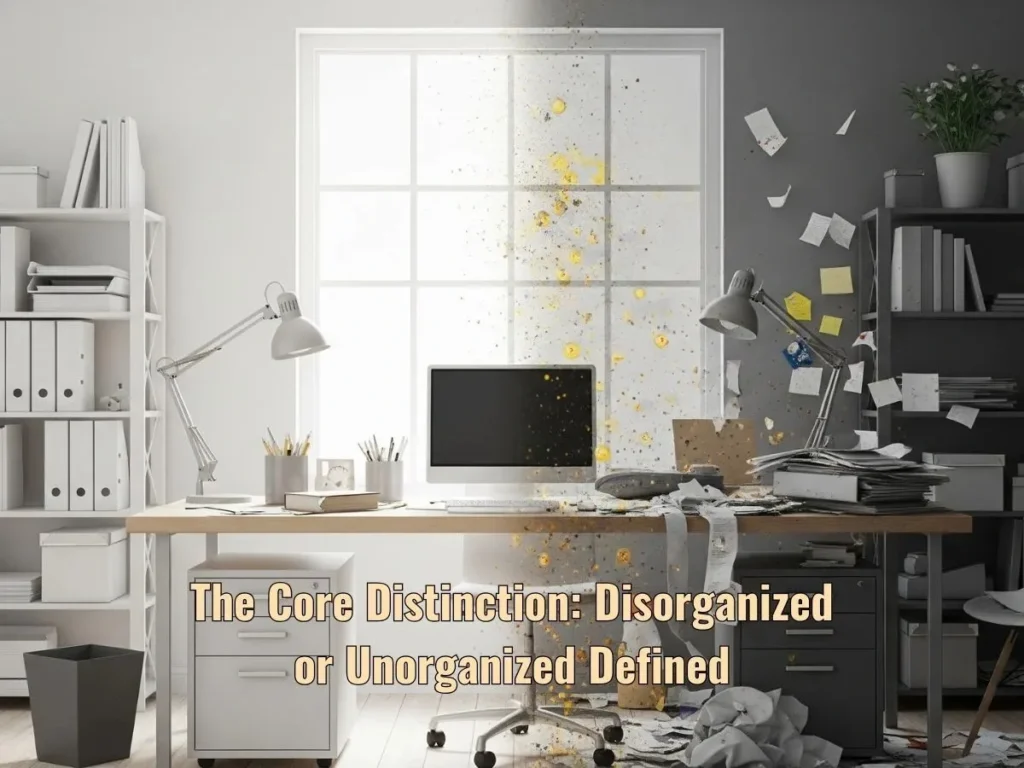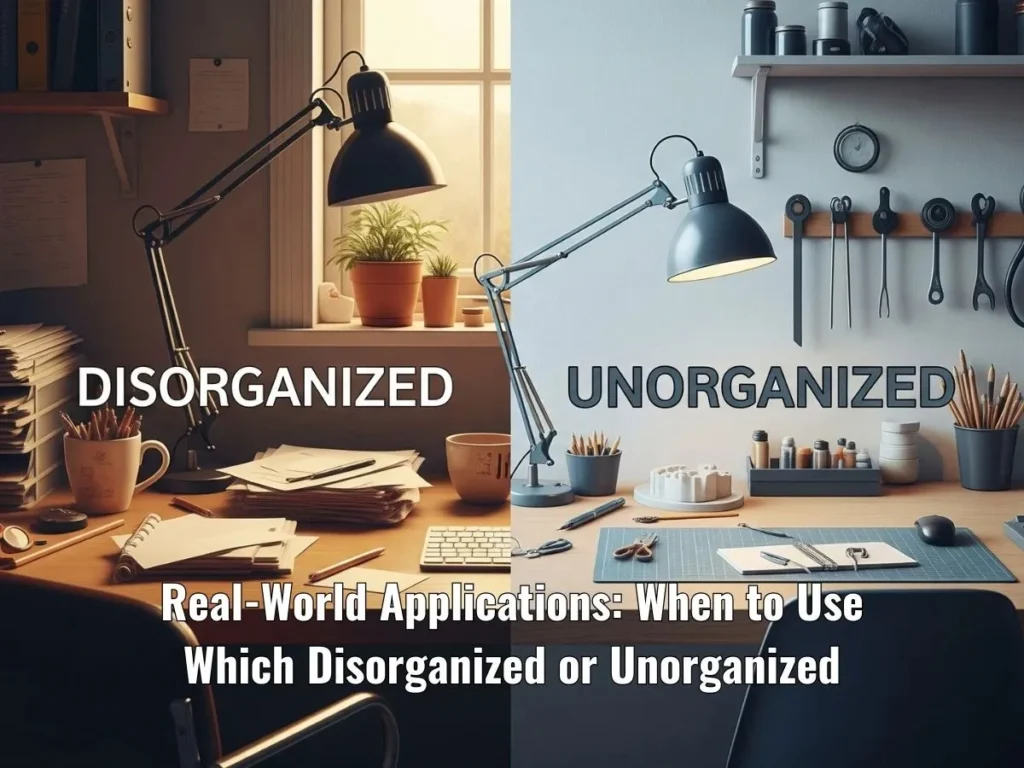Introduction
Have you ever stopped mid-sentence to argue about whether that desk is “Disorganized or Unorganized”? You’re not alone.
Here are two confusing words that appear to be used interchangeably. Except that they have different, nuanced meanings. These distinctions can subtly alter what you’re saying.
This difference is more than a grammar lesson. It’s about improving your English and speaking more precisely. This guide will explain these terms.
We’ll delve into their linguistic underpinnings and provide some practical usage advice. You’ll learn to use them right, every time.
The Core Distinction: Disorganized or Unorganized Defined

To truly grasp the nuances, it is essential to define both terms first. In either case, you’ll find no order. However, their implications about how that state of affairs came about differ radically.
What “Unorganized” Truly Means
The release that comes around the sound of it, with which we associate it like anything when we hear it in consequence of that something else, means the acceptance by the mind of the assertion of “unorganized.”
Think of it as an absence. No one created its structure. It means a natural or unarranged beginning. Think of a stack of freshly printed photos before you organize them into albums. They are unorganized. You have not yet organized them into categories or order.
Likewise, some number of assembled humans could be an “unorganized crowd. It does not have a leadership or any structure in the beginning.
Key Points about “Unorganized”:
- Lack of a system or organization.
- And it wasn’t a previous deal, ever.
- Synonyms: haphazard, unordered, unstructured, disorganized (from the beginning).
Examples:
- The raw data in the spreadsheet was very disorganized to analyze .
- Her thoughts were a mess on a whiteboard. You needed a device that would connect them in series.
What “Disorganized” Implies
“Disorganized, in contrast, means something was once organized but is now a mess. It points to an earlier state of order that decayed. The ‘dis-‘ prefix is, of course, essential. It indicates a reversion or return to the past.
Imagine if the pet had just deleted all the photos from the same album. Photos that you neatly stacked are now spilling out in disarray.
The system was in place, but now it’s unraveling. A neat desk left untidy during a hectic week becomes just as disorganized. Its old pecking order has collapsed.”
Key Points about “Disorganized”:
- A pre-existing state of order was shattered or subverted.
- It refers to the disintegration of an established system.
- Synonyms: behind or reversed); confused, disordered, disrupted, or scrambled (from a malfunction).
Examples:
- “His clean desk became cluttered after the last-minute, frenzied project.
- “The normally well-oiled squad seemed in shambles following the overnight coup.
The Prefixes Tell a Story: Un- vs. Dis-
The distinction between these two words is a linguistic one, based on the prefix each carries. For “un-” and “dis-“, knowing the etymology will help you remember their relatively separate meanings.
“Un-“: Simple Negation or Absence
The prefix “un-” is old and originates from Old English. It mainly denotes negation or absence of the quality or state. It just means “not” or “the opposite of.”
How about words such as “unhappy” (not happy) or “unclear” (not clear)? When placed before “organized,” “unorganized” essentially translates as ”not organized” out of the gate.
Key Points:
- Origin: Old English.
- Function: Not, absence of.
- Examples: unhappy, unclear, undone.
“Dis-“: Reversal, Separation, or Undoing
The prefix ‘dis-,’ however, entered English primarily through Latin and French in Middle English. It often shows a reversal or negation, a separation, or a ‘removal’ of something that shifted from an earlier state or that was previously there and linked.
Think of ‘disconnect’ (break a connection) or ‘disappear’ (cease to appear). When you put it alongside ‘organized,’ ‘disorganized‘ means something has lost its order.
Key Points:
- Origin: Latin/French influence.
- Operation: Counterpart, reversal of state, to disassemble.
- Then we can have: disconnect, disappear, discomfort.
- External Resource: To explore word origins for more words, you can refer to a reliable etymology dictionary such as Merriam-Webster’s Etymology Dictionary.
Real-World Applications: When to Use Which Disorganized or Unorganized

And now, let’s examine some real-world use cases where this subtle nuance is truly worth noting. This provides further assurance for the distinction between Disorganized or Unorganized.
Unorganized in Action: Initial State of Disorder
Reserve “unorganized” for things that were never intended to be, or never have been, systematically organized.
Examples:
- Raw data: “There was nothing so completely unorganized as the survey’s raw data prior to anybody’s going over it;”
- Natural formations: “The beach stones were naturally disordered, thrown by the waves.
- On-the-fly things: “The flash mob was so disorganized/ spontaneous for public performance, but cute.”
Disorganized in Action: Lost Order
Use ”disorganized” to describe something disordered as a result of having been organized.
Examples:
- Projects or teams: The project suffered from a lack of communication and missed deadlines.
- Personal spaces: My home office, although in perfect order at the moment, becomes a disorganized mess following tax season.
- Schedules or plans: His daily schedule got out of whack after he began working two jobs.
The “Disorganized Person or Unorganized Person”: A Key Distinction
This confuses a lot of people. Both words suggest an individual who has trouble keeping things neat and organized. But those are details that matter.
A ”disorganized person” usually means someone who has lost whatever order they might have once had. Or, they may wish for order but are unable to achieve it.
They may frequently lose objects or have a desk that alternates between being neat and disorganized. This individual may still forget appointments, even with a calendar. The meaning is a battle between organizations that are advocating for a cause.
An “unorganized person,” in contrast, could mean someone who never makes organizing a priority or formalizes a system in their life or work.
They may be naturally spontaneous or inclined to a more fluid approach. They may not recognize the demand for strict systems. This person isn’t deficient; they work differently from you.
Common Mistakes & Memory Tricks for “Disorganized or Unorganized”
And even with clear definitions, there is plenty of opportunity to get it wrong. Let’s solidify that understanding and provide you with an easy trick to remember the difference.
Pitfalls to Avoid: Are They Interchangeable?
No, “Disorganized or Unorganized” cannot be used interchangeably. They look the same, but there are subtle issues in using them as described above.
- Avoid “unorganized” if the thing or entity had a previous structure that became disintegrated.
- Don’t use “disorganized” if there was no order or system from the beginning.
A Simple Trick to Remember the “Disorganized or Unorganized” Difference
If you want to be sure to use the correct word every time, practice this easy mnemonic:
- Dis for Disrupted: Think of ‘disorganized’ as something that lost its previous order. It was then organized, but it is no longer be organized.
- “Un” for “Unborn”: Think of “unorganized” as something where organization was never born or initiated. It simply exists without prior order.
Conclusion: Master Your Message
Once you understand the nuanced difference between Disorganized or Unorganized, you have a great way to communicate more precisely in English.
Recall: “unorganized” means to have no order to start with; “disorganized” means to strip away already-existent order. This nuanced but important difference in meaning will enable you to express yourself more precisely and clearly.
Now that you have a grasp of this differentiation, review your writing and conversations. Start applying this new knowledge and improve your vocabulary with confidence!
Just a note, does this language intrigue you? Discover our other common writing errors by exploring our library!
FAQs
Is it Disorganized or Unorganized in the Oxford Dictionary?
You can find both terms recognized. ‘Unorganized’ describes a lack of original order; ‘disorganized’ describes the destruction of a former order.
What is the difference between Organized and unorganized?
“Organized” has a system; “unorganized” lacks a system from the start.
Can we say “unorganized”?
Yes, “unorganized” is a perfectly valid and commonly used word.
What is being disorganized?
Disorganization, after all, implies that something has lost its previously organized state, becoming confusing or, yes, a mess.
What is the word for not being organized?
Both “unorganized or disorganized” mean the lack of organization, with subtle differences in meaning.








